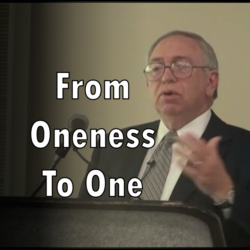Last time we worked through a ton of scripture, trying to get a multidimensional view of how the bible describes the holy spirit. This time we’ll consider a few scriptures that have confused some into thinking the spirit is really an individual or person distinct from the Father and the Son. This study is pretty technical, though I did my best to make the grammatical Greek points understandable. Even so, it will be difficult to follow along unless you download the handout we used in class.
Here is the handout I used in class:
 Loading...
Loading...
—— Notes ——
I didn’t follow these notes very closely, but instead mostly worked from this handout at least until later in the lecture. Even so, I thought these additional notes may be useful for your study.
State the Doctrine Simply
The spirit is God/Christ in action
Reasons that Support Non-Personality of the Spirit
- The Holy Spirit Does Not Have a Name
- The Holy Spirit Never Sends Greetings (1 Cor 1.3; 1 Jn 1.3)
- The Holy Spirit Is Owned by God (Spirit of God) (1 Cor 2.11)
- The Holy Spirit Is Never Prayed To (Jn 16.23)
- The Holy Spirit Is Left Out of Key Passages (Jn 10.30; Mt 11.27; Mk 13.32)
- The Holy Spirit Not in Visions of Heaven (Rev 3.21; 4; 5)
What about All Those Personal Pronouns in John 14-16?
- the word “spirit” πνευμα in the NT is neuter not masculine or feminine
- use handout instead of what’s below unless we are short on time
Nearly all modern translations have adopted the standard of using personal pronouns (like “he” and “him”) in reference to the holy spirit. This is unusual because the word “spirit” or pneuma is neuter in Greek, and the pronouns the Bible uses are likewise neuter (like it and which). Although it is often the case that masculine and feminine Greek pronouns are translated in English as “it” or “which,” neuter words in Greek are virtually never translated into English using personal pronouns except when referring to the spirit. Immediately, this double standard should grab our attention as a potential area of bias in translation. Jason BeDuhn insightfully explains the matter as follows:
Jason BeDuhn on Translating Greek Gender into English
Now it turns out that both “masculine” and “feminine” Greek nouns can be used for impersonal things as well as persons. But “neuter” nouns are used only for impersonal things, such as objects, animals, forces, abstract principles, and so on. The same holds true for “masculine,” “feminine,” and “neuter” pronouns…But even though the “personal” category is larger in Greek than in English, the “Holy Spirit” is referred to by a “neuter” noun in Greek. Consequently, it is never spoken of with personal pronouns in Greek. It is a “which,” not a “who.” It is an “it,” not a “he.” This is the case, then, where the importance of the principle of following primary, ordinary, generally recognized meaning of the Greek when translating becomes clear. To take a word that everywhere else would be translated “which” or “that,” and arbitrarily change it to “who” or “whom” when it happens to be used of “the holy spirit,” is a kind of special pleading. In other words, it is a biased way to translate. And because this arbitrary change cannot be justified linguistically, it is also inaccurate.[1]
However, the word parakletos (comforter, helper, etc.) in Jesus’ last supper discourse is masculine in Greek. Still, grammatical gender is entirely different from sexual gender. For example, in Greek, the word “city” is feminine and the word “treasure” is masculine. As a result, when the NT refers to a city, feminine pronouns are used and when treasure is represented by pronouns, masculine ones are used. How does this translate into English?
A Feminine Pronoun Translated as Neuter
“When he approached, he saw the city [feminine] and wept over it [feminine]” (Luke 19:41).
The word translated into English “it” is literally the Greek word for “her.” Yet, the translators still used an impersonal pronoun because that is how English works.
A Masculine Pronoun Translated as Neuter
“The kingdom of heaven is a like a treasure [masculine] hidden in the field, which [masculine] a man found…” (Matthew 13:44).
Why isn’t the word “which” translated “who” if it is masculine? This is because in English we never designate non-persons with masculine and feminine pronouns unless a figure of speech called personification is taking place. For example, ships and cars are sometimes represented in English with feminine pronouns, but everyone recognizes that they are impersonal objects.
Thus, a word’s grammatical gender does not automatically imply sexual gender.[2] If it did, then one would be quite confused about the gender of the holy spirit. In Hebrew ruach is feminine, in Greek pneuma is neuter, and parakletos is masculine. If grammatical gender did imply sexual gender, what pronouns would we use: “she,” “it,” or “he?” The only way to determine how to translate the pronouns is based on the belief of the translator concerning whether or not the word in question is a person. This process works fine in most cases except when the theological bias of translators dictates personhood. In these cases (“word” in John 1:1-3 and “holy spirit” throughout the NT), the translators break their own consistency and impose their theological bias without leaving so much as a footnote. Then, honest Bible students see that masculine pronouns are used in reference to the spirit along with capitalization—an equally biased contrivance—and then claim because of this that the spirit is a person. The result is circular reasoning.
The word “spirit” is neuter; therefore, the pronouns referring to “spirit” should be translated accordingly as “it,” “which,” etc. If modern translators followed this standard, there would be little question about the holy spirit (at least until the reader broached John 14:16 where parakletos (helper) is masculine and may thus be referred to with masculine pronouns). Everything depends on whether or not the translator believes the paraklete is a person, but this is a theological rather than grammatical question. Even so, several times in the context, these two words are used interchangeably. This has a significant bearing on the matter.
John 14:16-17
…He will give you another helper, that he may be with you forever; that is the spirit of truth, whom the world cannot receive…
John 14:25-26
These things I have spoken to you while abiding with you. But the helper, the holy spirit, whom the Father will send in my name…
John 15:26
When the helper comes, whom I will send to you from the Father , that is the spirit of truth who proceeds from the Father, he will testify about me
John 16:13
I have more things to say to you but you cannot bear them now. But when he, the spirit of truth comes, he will guide you into all the truth…
The helper is the holy spirit (or spirit of truth). Since pneuma, the word translated “spirit,” is neuter, it is clear grammatically that the spirit is not a person. Furthermore, if in the other sixty-five books of the Bible the spirit is not a person (and the helper is equated to the spirit), then we must conclude that the helper (although represented by a masculine noun and masculine pronouns) should also be translated as neuter. The only reasonable exception would be if personification is in use.[3]
What about the Phrase “The Holy Spirit Says?”
Several texts have been used to support the belief the holy spirit is a person because the holy spirit speaks (2 Samuel 23:2; Matthew 22:43; Mark 12:36; Acts 1:16; 28:25; Hebrews 3:7; 9:8). Although communicating (i.e. speaking one’s mind) is certainly an indication of personhood, this is not necessarily the case for these texts because the spirit is a way of talking about God in action. Peter put it this way, “for no prophecy was ever made by an act of human will, but men moved by the holy spirit spoke from God” (2 Peter 1:21). God speaks through the holy spirit; it is not only His finger but also His mouth. This is how we came to have the Scriptures. They were a result of God’s inspiration of the writer through the medium of His spirit, word, and wisdom.
It is a well-known fact that the Jews have regularly used other words in an effort not to pronounce God’s name. For example, “heaven,”[4] “blessed,”[5] “holy One,”[6] “Lord,”[7] etc. are ways of referring to Yahweh without uttering His name. In like manner, the phrases “word of God,” “spirit of God,” “breath of God,” “wisdom of God,” “glory of God,” and “power of God,” are circumlocutions for God’s activity in the world. Dunn is once again helpful here:
James Dunn on “The Holy Spirit Says”
As for the rabbinic formula (‘The Holy Spirit says’), is this any more than what we might call a literary hypostatization? —that is, a habit of language which by use and wont develops what is only an apparent distinction between Yahweh and one of these words and phrases used earlier to describe his activity towards men (here particularly in inspiring scripture). Have we in all these cases any more than a personification, a literary (or verbal) device to speak of God’s action without becoming involved every time in a more complicated description of how the transcendent God can intervene on earth? —in other words, simply a useful shorthand device (‘Spirit of God,’ ‘glory of God,’ etc.) which can both express the character of God’s immanence in a particular instance and safeguard his transcendence at the same time without more ado.[8]
What about the Intercession of the Holy Spirit?
The following text is quoted in an attempt to prove that the holy spirit is a person:
Romans 8:26-27
In the same way the spirit also helps our weakness; for we do not know how to pray as we should, but the spirit himself intercedes for us with groanings too deep for words; and he who searches the hearts knows what the mind of the spirit is, because he intercedes for the saints according to the will of God.
Joseph Thayer reads this text as follows:
Joseph Thayer on Romans 8:26
Romans 8:26 means, as the whole context shows, nothing other than this: ‘although we have no very definite conception of what we desire, and cannot state it in fit language in our prayer but only disclose it by inarticulate groanings, yet God receives these groanings as acceptable prayers inasmuch as they come from a soul full of the Holy Spirit.’[9]
Another possible way to understand this text is to remember that the spirit is used interchangeably with Christ (cf. Romans 8:9-11). If this is the case here, then Christ is the one who intercedes on our behalf. This interpretation gains traction once we realize that a few verses later Christ is called the one “who also intercedes for us” (Romans 8:34). It is not at all unexpected to see a blurring of categories here; this is common in Paul’s letters.
What about Blasphemy against the Holy Spirit?
Occasionally, people claim that denying the personality of the holy spirit is the unforgivable sin of blaspheming the spirit. In order to get to the bottom of the matter, we must remember the context of Jesus’ remarks about blaspheming the holy spirit. A demonized man was healed by Christ, and the Pharisees accused Jesus of casting out demons by Beelzebul, the ruler of demons. Christ pointed out the absurdity of “Satan casting out Satan” and then confessed that it was by God’s spirit that he cast out demons. Then he made the statement, “Whoever speaks a word against the Son of Man, it shall be forgiven him; but whoever speaks against the holy spirit, it shall not be forgiven him, either in this age or in the age to come” (Matthew 12:32). Blasphemy against the holy spirit is observing God in action through His human Messiah and declaring that the source of his power was demonic rather than divine. In essence, they were calling God the prince of demons. This sort of unrepentant, hardhearted, intentional blasphemy against God at work in His Messiah is unforgivable.
Lie to the Holy Spirit
Acts 5.3
3 But Peter said, “Ananias, why has Satan filled your heart to lie to the Holy Spirit and to keep back for yourself part of the proceeds of the land?
- the very next verse makes it clear we are talking about God (presumably, who is present via his spirit)
- Acts 5.4
4 While it remained unsold, did it not remain your own? And after it was sold, was it not at your disposal? Why is it that you have contrived this deed in your heart? You have not lied to man but to God.” - Jesus called the spirit “the finger of God” (cf. Lk 11.20 vs. Mt 12.28)
- the spirit is God in action
- thus, to lie to the spirit is to lie to God
[1] Jason David BeDuhn, Truth in Translation ©2003, University Press of America, page 140.
[2] We have already noted that if a Greek word is neuter, then it does reflect that in English, and the word should use impersonal pronouns.
[3] Personification would not be unusual because this technique is often used to express truth in Scripture (for example, wisdom is personified as a lady in Proverbs 8). Also, note that Jesus himself said “these things I have spoken to you in figurative language…” (John 16:25).
[4] Matthew 19:23-24; Mark 11:30; Luke 15:18, 21
[5] Mark 14:61; 1 Timothy 6:15
[6] 2 Kings 19:22; Job 6:10; 1 John 2:20
[7] Virtually every OT quotation in which “Yahweh” had appeared has been rendered “Lord” (kurios).
[8] James DG Dunn, Christology in the Making (second edition) ©1989, Eerdmans Publishing Co. page 134.
[9] Joseph Henry Thayer, D.D., A Greek-English Lexicon of the New Testament ©1977, Mott Media, page 522
—— Links ——
- Check out Patrick Navas’ book, Divine Truth or Human Tradition
- See these articles on the spirit: A Unitarian View of the Holy Spirit, Translating the Holy Spirit 1 and Translating the Holy Spirit 2
- For the textbooks, check out the New Bible Dictionary and Greg Deuble’s They Never Told Me This in Church. Also, listen to an interview with Deuble here.
- See other episodes in this Theology Class
- Find more Restitutio classes here
- More information about Converge 2019
- Intro music: Jazzy Frenchy by bensound.com. Licensed under Creative Commons: By Attribution 3.0 License.








There was a better answer of cross-references that clearly showed the Acts 5:3-4 verse was regarding “God” as the Father and this meaning of “spirit” had to do with the authority of the apostles whom God had bestowed the spirit. Basically, if God was in them and their teachings–then to disobey them was also to disobey God.
I want to believe it was in one of Anthony Buzzard’s books–but I can’t quite recall for sure. The references in the NT is self-explanatory and the OT shows the same principle with Moses.
1 Thess 4:8
7 For God did not call us to uncleanness, but in holiness. 8 Therefore he who rejects this does not reject man, but God, who has also given us His Holy Spirit.
Psalm 106:32-33
32 They angered Him also at the waters of strife,
So that it went ill with Moses on account of them;
33 Because they rebelled against His Spirit,
So that he spoke rashly with his lips.
Basically, it’s the same representational principle explained many times through the Bible–to disobey a message from a man given by His(God, the Father in this case) spirit is to disobey God.